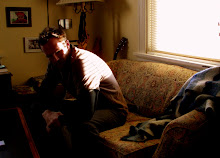I got outside her building and stood there on the stoop in the pale orange street-lit dark, fishing my cigarettes out of the breast pocket of my jacket. I really didn't need one, but it was cold again, and I was still sick. I got it lit and hearing a dog bark, looked up. There was a woman sitting on a porch in the stacked row bungalows across the street, looking at me. I suddenly felt marked, filed away in a catalog of whoever else came and went from the quiet dramas of that building- "Lanky Construction Worker." I got down the steps wondering myself what business I had here.
I had done work around the corner, so this block was known to me, but not on a sidewalk level of intimacy. There was a big filthy white 80's era caprice that was mostly always there, covered in anti-abortion propaganda. I tried not to notice the black and white images of fetuses lining the dash. It was mid-winter in my city, my boots conspicuously loud on the sidewalk in one of the few times I had been out of doors in three days. I pulled on my cigarette and tried not to appear skittish.
This block was the new marginal, pushed further away from downtown, tall buildings filled with one-rooms, Victorian porches replaced with treated-lumber decks, packed with bicycles and reckless debris. I marked each alley as I walked. Down one I heard the low guttural roar of a big diesel, and glimpsed a yellow tow-truck dragging someone out of a far lot, orange lights skimming the periphery. I avoided the memory of getting my own truck that morning out of a ragged lot under a too-big cold blue sky, and the money that I didn't have for it. I tried not to think about work.
The side streets punctuating the long blocks there had small one-story shops in them. I walked the length of one, wide windows open to a wide room, pregnant with opportunity. I placed a work bench in the middle of the space, in late-day sunlight, covered in thin purple walnut shavings, or else a crowded room encircled with bright canvases, children chasing each other around a maze of grown-ups.
I crossed the street to the closed laundromat and the Korean grocery I had been making for, pulled on the cigarette twice outside the door, and left it burning, cherry end off one edge of a newspaper box.
The man, mid fifties, greeted me in the empty store and went back to his paper. The shelves were plywood and thinly stocked in that stripped down 50's grocery kind of way. I tried to imagine what I could bring back that she could keep down. I noticed a bag of Chips Ahoy and remembered, suddenly, my mother microwaving them so that they were soft and the chocolate slightly melted. I decided against it, that would be for my kids, next time I saw them. I imagined them sleeping, miles across town. I considered how much of my daughters left-over anti-biotic I had, and whether I should be sharing it with the girl. I settled on a box of Ritz-crackers and a bottle of Ginger ale, the same thing that had gotten me through the last few days.
The Korean man's dark eyes were friendly but hard to read as he rang me up, probably because I myself felt suspicious. He asked, "Cold outside?" and I responded, "Yes, sick. Stomach," gesturing at my purchases. He said, "Ah, yes, going around." I got some money out of my wallet and handed it to him, wondering about the last time I had washed my hands as well as the next time he would wash his. I tried not to think about the money.
He had on a navy baseball hat with the same Blue-Ridge Parkway patch I had stitched on my leather jacket some months ago. The emblem of a tall pine next to a road. He bagged me up and I got out the door, thinking of high country in North Carolina and running it fast and alone. A country were not much else grows except mountain laurel and pines. I decided I did not want to run away.
The street was as empty as ever, and quiet now. This was not home anymore, it was suddenly Brooklyn except I was not strung-out tonight, I was merely sick. There was no reason for me to ever go back to Brooklyn anymore, and that I probably wouldn't for a long time. No bridge, no tall narrow channels of avenues, no dirty open water where they ended. There were bricks underfoot here and more trees and that was good enough. It was not a grim feeling and did not make me sad. I filed it away, my purpose that night was to get back to the girl I had left on the couch and care for her if I could. I picked up my pace.
She had blue eyes that were different from mine, neither the blue-green of a turbulent ocean nor the steel gun-metal blue of the sky in November. Startling blue, they flashed and were quick and hard to lock on to. They were more blue than anything I had ever seen before. They sometimes frightened me with the thought that anything could happen. I rounded the corner onto her block and considered once more the abortion car. It's Virginia plate said "ALL GOD," and the owner had carefully filled in either side with black letters, so that he carried more of his message across the bumper. It read "We are ALL GOD's children."

